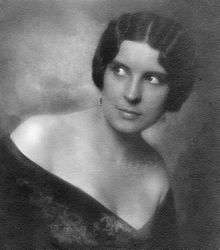Hanna Ralph
| Hanna Ralph | |
|---|---|
 Hanna Ralph c. 1918 | |
| Born |
Johanna Antonia Adelheid Günther 25 September 1888 Bad Kissingen, Germany |
| Died |
25 March 1978 (aged 90) Berlin, Germany |
| Occupation | Actress |
| Years active | 1913–1952 |
| Spouse(s) | Emil Jannings (1923-1950) (his death) |
Hanna Ralph (25 September 1888 – 25 March 1978)[1] was a German stage and film actress whose career began on the stage and in silent film in the 1910s and continued through the early 1950s.
Career
Born Johanna Antonia Adelheid Günther in Bad Kissingen, Germany, she made her stage debut in 1913 at the Schauspielhaus in Frankfurt. From 1914 to 1915 she worked at theatre in Mainz and in 1916 at the City Theater in Hamburg. In 1917 she began working on various stages in Berlin.
Hanna Ralph made her screen debut in the 1917 Ludwig Beck-directed short Die entschleierte Maja, opposite actor Walter Janssen and the following year had a starring role in director Georg Jacoby's Keimendes Leben, Teil 1, opposite Emil Jannings. The film serial was followed by Keimendes Leben, Teil 2 in 1919. One of her most popular roles during her early years in films was that of the role of Katarina in Carl Froelich's 1921 film adaptation of Fyodor Dostoevsky's novel Die Brüder Karamasoff (The Brothers Karamazov), with actors Fritz Kortner and Bernhard Goetzke. In 1924 she appeared in the Herbert Wilcox-directed romantic drama Decameron Nights opposite American stage and screen actor Lionel Barrymore, and in Fritz Lang's silent fantasy film Die Nibelungen, based on the epic poem Nibelungenlied, as Brunhild. In 1926 she appeared in the internationally successful F.W. Murnau-directed, Universum Film AG (UFA) distributed Faust – Eine deutsche Volkssage opposite Gösta Ekman, Camilla Horn and husband Emil Jannings.[2]
Hanna Ralph's career withstood the transition to sound film, however she appeared in only three films of the 1930s; instead, she spent much of the decade in theatre. By the Second World War she retired from acting. After the war's end, she briefly returned to film in the early 1950s; appearing in small roles in director Wolfgang Liebeneiner's 1951 crime drama Der blaue Stern des Südens and Harald Reinl's 1952 drama Hinter Klostermauern (English release title: The Unholy Intruders) before retiring from acting altogether.
_-_Portrait_of_the_actress_Hanna_Ralph_(1885-1978).jpg)
Personal life
Hanna Ralph was married to the German actor Emil Jannings in 1920, however the marriage ended in divorce.[3] She was later briefly married to director Fritz Wendhausen. She died in 1978 in Berlin, Germany at the age of 90.
Awards
In 1968 she was awarded the Bundesfilmpreis for her legacy as an actress in German cinema.[4]
Selected filmography
- Ferdinand Lassalle (1918)
- Algol (1920)
- The Brothers Karamazov (1921)
- Die Nibelungen (1924)
- Decameron Nights (1924)
- The Tower of Silence (1924)
- Helena (1924)
- Faust (1926)
- Restless Hearts (1928)
- Napoleon at Saint Helena (1929)
- The King of Paris (1930)
References
- ↑ Born 1888, as per birth registry, Bad Kissingen, see Kay Weniger: Das große Personenlexikon des Films.
- ↑ Hanna Ralph at Cyranos
- ↑ Emil Jannings profile, Cyranos.ch.
- ↑ Profile, deutsche-filmakademie.de; accessed 26 October 2014.
External links
| Wikimedia Commons has media related to Hanna Ralph. |